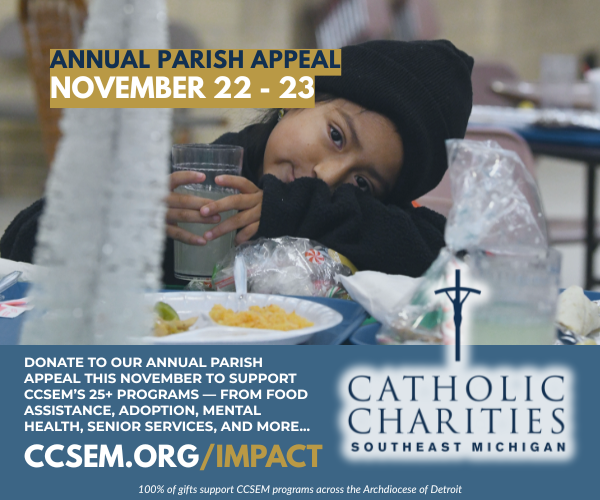Archbishop Weisenburger encourages faith, participation after Archdiocese of Detroit announces two-year restructuring effort
DETROIT — As the Archdiocese of Detroit prepares to undertake a two-year restructuring effort, Archbishop Edward J. Weisenburger said he wants “every Catholic in southeast Michigan to have a voice in the process,” and called for faith and trust in God’s plan for the local Church.
Addressing media Nov. 17, a day after the archdiocese announced it would begin a collaborative process of restructuring its parishes and ministries, Archbishop Weisenburger expressed a vision for a stronger, more vibrant Catholic presence in southeast Michigan.
“We read in the Scriptures that perfect love casts out all fear, and it’s only when we cast out all fears that we can really move forward as a people of faith,” Archbishop Weisenburger said during a news conference at the Cathedral of the Most Blessed Sacrament.
To learn more about the Archdiocese of Detroit’s two-year restructuring process, including how to get involved, visit restructuring.aod.org.
The Archdiocese of Detroit’s restructuring process — which was announced during Masses the weekend of Nov. 15-16 — will impact each of the archdiocese’s 209 parishes, and comes as the local Church has experienced significant declines in Mass attendance, sacraments and priestly ordinations in recent decades.
The archdiocese currently has about 900,000 Catholics, a decrease of about 40% from a peak of 1.5 million in the mid-1980s. Of that number today, only about 150,000 regularly attend Mass.
The trends in Detroit aren’t unique, Archbishop Weisenburger said; in recent years, more than 30 U.S. dioceses have undergone similar restructurings.

“This is happening across the nation,” Archbishop Weisenburger said. “It’s something I’ve been praying about since I arrived this spring, and it’s really a continuation of what began under Archbishop (Allen H.) Vigneron, my predecessor, at the beginning of 2025.”
Following the COVID-19 pandemic, the Archdiocese of Detroit adopted a model of parish groupings called “Families of Parishes,” spurred in part by a shortage of available priests. In February, the archdiocese issued an update in which it projected it would soon have fewer priests than parishes.
By the end of the restructuring process, Families of Parishes will be retired, and each parish will become part of a “pastorate,” a group of one or more parishes led by a single pastor and his team.
The future of each parish will be considered individually and independently and consider multiple factors, Archbishop Weisenburger said. Each parish will host two listening sessions open to all parishioners in the spring of 2026.
While some church buildings will close as a result of the process, “there is no list and no preset number,” the archbishop said.
“We don’t know how many parishes or communities might merge or how many buildings might close,” he said. “The answers to those questions will only come about in time through a shared process of discernment.”
In January, priests of the Archdiocese of Detroit will gather to develop proposed pastorate models, which will then be shared with the faithful for feedback and input.
Through the spring listening sessions, Church leaders intend to “hear the concerns, the hopes, the desires and the fears of our people, and also allow them to take part directly in a process that will shape our Church,” Archbishop Weisenburger said.
Fr. Mario Amore, executive director of the Archdiocese of Detroit’s Department of Parish Renewal, said the process will be as transparent and straightforward as possible.
“We’re taking everything into consideration,” Fr. Amore said during the news conference. “That’s one of the reasons we’ll be offering two listening sessions in each of our parishes. This is the opportunity for parishioners to give their feedback.”

Demographics and data about each parish — including sacramental and financial trends — will be compiled and shared publicly on a website created for the restructuring initiative, restructuring.aod.org, Fr. Amore said.
While data will inform the process, it won’t be the sole determining factor, he added.
"We want to make sure our footprint doesn't decrease across the archdiocese," Fr. Amore said. "There will always be a Catholic presence. Especially in those areas where there might not be a large Catholic population, the Church still needs to be there."
Archbishop Weisenburger said there are many “complex” reasons for the Catholic decline in southeast Michigan, including population losses in the city of Detroit itself, which has seen a decline of more than 1 million residents since its peak.
Archbishop Weisenburger also cited a rise in secularization and a general withdrawal from community, which have both contributed to a crisis of loneliness and isolation.
“We have more sadness, despair, lack of meaning and existential angst than perhaps ever before in our history,” Archbishop Weisenburger said. “It’s not just churches that are seeing less members. It’s all kinds of organizational entities.
“This increasing isolation in our homes and away from communities is a crisis,” he continued. “It’s a social crisis, but it’s very much reflected in all segments of society, including religion and the practice of the faith.”
Fewer practicing Catholics has also meant fewer priests, with an aging clergy caring for more and more parishes and communities, he said.
“Most of our active priests are now over the age of 50, and with fewer priests and fewer parishioners, we’re feeling the strain of maintaining buildings and sites and ministries that we can realistically sustain,” the archbishop said. “It’s taking up a lot of our energy and resources that we would rather see in evangelization, in sharing the Gospel.”

In the eight months since his arrival in the Archdiocese of Detroit, Archbishop Weisenburger said he’s visited and spoken with many Catholics who are “concerned for their priests.”
“People tend to love their priests, and they worry for their priests the same way priests worry for their people,” Archbishop Weisenburger said. “I’ve had so many people say, ‘Father works so hard.’ We have a lot of priests working very hard, and that’s a primary concern.”
Acknowledging the difficult work ahead, Archbishop Weisenburger said closing churches is never easy, especially in places where generations of families have celebrated baptisms, confirmations, weddings and funerals.
In some instances, the archbishop said, churches that once saw 1,000 or more parishioners per weekend might only have 60 people attending Sunday Mass.
“I grieve deeply whenever I see a church closed or sold,” the archbishop said. “In the Catholic world, our buildings become imbued with a sense of holiness. To us, they become not just a place where sacred things happen, but a sacred space. There’s always a lack of ease, a frustration and anxiety about the potential of losing a place that’s sacred to us.”
But while churches are places of holiness and grace, Archbishop Weisenburger said the true foundation of the faith — Jesus Christ — remains with the Church through all times and seasons, and is the source of hope in every difficulty.
“In our Gospel recently, Jesus encounters people admiring the temple, and they were saying, ‘Is it not the beauty of the world?’ And Jesus responds, ‘The day will come when not stone will be left on stone,’ which is the situation today of that beautiful temple.
“Jesus reminds us that in every age, the only lasting foundation is him,” Archbishop Weisenburger said. “It hurts to think of a church that’s not a church anymore. But I also have to be a man of faith, and to trust in the foundation upon which we build the Church. It’s not the beautiful bricks and stone and glass, but rather, the foundation is Christ in every age.”
A Prayer for Restructuring the Archdiocese of Detroit
Come, Holy Spirit.
Make your presence known
as we restructure the parishes and ministries
of our Archdiocese.
Be our light on the path we walk together.
Help us hear your voice
in the quiet of our hearts,
in the wisdom of others,
and in the world around us.
We know you are with us in every step of the process.
Give us clarity, understanding, and direction
In all things, help us share the light of your love. Amen.
St. Anne, pray for us.
Blessed Solanus Casey, pray for us.
Mary, Mother of the Church, pray for us.
Learn more
To learn more about the Archdiocese of Detroit’s two-year restructuring process, including how to get involved and what to expect in the months ahead, visit restructuring.aod.org.
Copy Permalink
Archdiocese of Detroit Archdiocesan Restructuring












